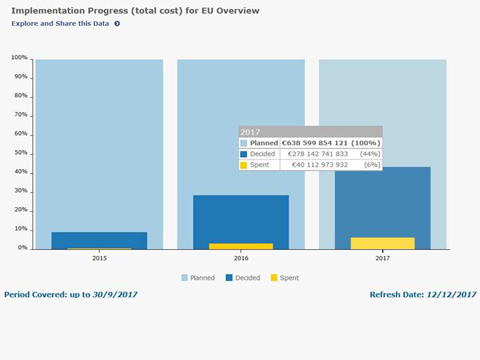A new report published highlights what the five EU funds have achieved since the beginning of the funding period, as the implementation of the 2014-2020 programmes has now reached full speed. By October 2017, almost half of the European Structural and Investment (ESI) Funds' budget for 2014-2020 had been committed to concrete projects. By the end of 2016, almost 793,500 businesses had received support from the funds, creating an estimated 154,000 new jobs. 7.8 million people have
- 13 December 2017

A new report published highlights what the five EU funds have achieved since the beginning of the funding period, as the implementation of the 2014-2020 programmes has now reached full speed.
By October 2017, almost half of the European Structural and Investment (ESI) Funds' budget for 2014-2020 had been committed to concrete projects. By the end of 2016, almost 793,500 businesses had received support from the funds, creating an estimated 154,000 new jobs.
7.8 million people have already benefitted from assistance in finding a job or developing skills, while the biodiversity of 23.5 million hectares of agricultural land has been improved. Overall, 2 million EU-funded projects had been selected by the end of 2016, which is 1 million more than the year before.
Commissioner for Regional Policy Corina Crețu said: "The number of EU-funded projects doubled in just one year, which shows that we have now reached cruising speed in terms of implementation. The European Structural and Investment Funds are fully at work and will blow wind in Europe's sails into the next decade."
In addition to EU-funded digital, social inclusion and environmental projects now seeing the light of day, the report shows that novelties introduced in the 2014-2020 funding period really paid off.
New prerequisites contributed to a better environment for investments
In March 2017, a first assessment of the new prerequisites to successful investments ('ex-ante conditionalities') showed that these proved to be powerful incentives for reforms across a wide variety of sectors – compliance with energy efficiency or public procurement legislation, investment planning for innovation, transport or digital technologies.
For the post-2020 financing period, it is envisaged to strengthen further the link between EU funds and the support to structural reforms in the Member States, as outlined in the Commission's reflection paper on the future of EU finances and in the Commission's proposals for the deepening of Europe's Economic and Monetary Union, presented last week.
Less red-tape for the beneficiaries of the funds
The report mentions that Member States have increasingly been using the simplification opportunities of the 2014-2020 Cohesion Policy framework, namely online procedures in the management of the funds ("e-cohesion"), simpler application processes for businesses ("single entry points") and simpler ways for beneficiaries to claim reimbursements from the EU.
Simplification is also at the core of the reflection on the architecture of the future Cohesion Policy, with the valuable input of the High Level Group on Simplification set by the Commission.
A smarter use of available resources led to an increased mobilisation of private finance
In line with the Investment Plan's objective to mobilise more investments, the 2014-2020 framework was set up to support a more widespread use of financial instruments. By the end of 2016, €13.3 billion under ESI Funds programmes was committed to such instruments, mostly for SME support, research and innovation and the low-carbon economy.
Over 76,000 businesses are currently supported by the ESI funds through financial instruments. SME support projects selected so far under the European Regional Development Fund (ERDF) represent €11.5 billion of leveraged private financing, out of a target of €42 billion.
More information:
